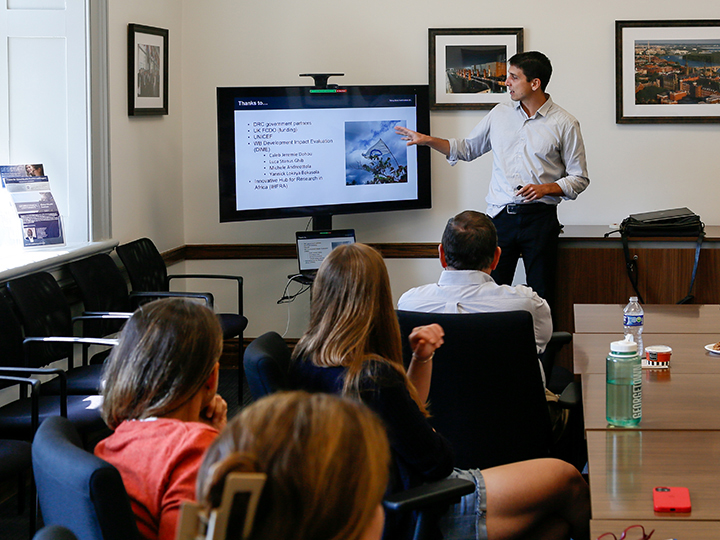Global Health Security Seminar Series Aims to Build a Community of Scholars
Feature Series: Global Public Health Seminars
Over the past two years the Georgetown University Global Health Security Seminar Series, launched in 2017, has shifted its focus from promoting greater discussion regarding pandemic preparedness to cultivating dialogue with fellow researchers working on public health at the university. While the series continues to highlight new voices and perspectives critical to enhancing pandemic preparedness, its core focus is helping to build a community of scholars.

Once a week, Georgetown faculty, postdoctoral researchers, students, and affiliates convene to present their works in progress, share areas of research, and engage in dialogue. Seminar topics during the fall 2023 semester have ranged from “Public Health and Soft Power: South Korea's COVID-19 Response and Implications for Soft Power” to "Reflecting on the 2014-2016 West Africa Ebola Outbreak: Did We Learn the Lessons? “
Promoting Campus-wide Collaboration
The presenting faculty and postdoctoral researchers hail from across the university, including the Department of Global Health, Department of Microbiology and Immunology, and Department of Health Management and Policy. Affiliated faculty at research centers such as the Center for Global Health Science and Security have also shared their work. This interdisciplinary community is united around a common call to advance the health and security of people and the planet.
John Kraemer, associate professor and chair of the Department of Health Management and Policy at Georgetown’s School of Health—who, along with Rebecca Katz, professor and director of Georgetown’s Center for Global Health Science and Security, helps to coordinate the seminar series—emphasized a key benefit of this new approach to the seminar series.
"Along the way, we get to know our colleagues better, leading to new and better collaboration."
Mindful of the lessons learned from the COVID-19 pandemic, which reinforced how much more there is to learn about how to better prevent and respond to the next pandemic, presenters come with a shared understanding that their research is better when they draw on the collective skills of the university’s extensive public health faculty. As a result, they are able to consider new ways of thinking about global health problems.
The Challenges of Research
At the onset of his October 2 presentation on the “Impacts of the National Rural WASH Program in the Democratic Republic of the Congo,” John Quattrochi, associate teaching professor at Georgetown University’s Graduate School of Arts & Sciences and director of the M.S. in Global Health Program, shared that the results of the trial were disappointing from a humanitarian standpoint. The trial tested a unique community-led water and sanitation intervention that combined behavior change, infrastructure, and institutional components, implemented at national scale. While the program succeeded in creating new infrastructure, it failed to improve child health.
During the question-and-answer session, the faculty, students, and staff in the audience engaged in a thought-provoking discussion with Quattrochi about why the intervention did not meet its intended goals and the challenges of optimal intervention design. He concluded his presentation by recognizing that there was still much to learn from these negative results.
"Every null result is a mystery waiting to be solved."
With its new focus on galvanizing and catalyzing global health dialogue, the seminar series is not only growing a community of scholars, but spurring collaboration to find actionable solutions for urgent health challenges.
